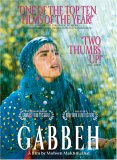| Reviews & Columns |
|
Reviews DVD TV on DVD Blu-ray 4K UHD International DVDs In Theaters Reviews by Studio Video Games Features Collector Series DVDs Easter Egg Database Interviews DVD Talk Radio Feature Articles Columns Anime Talk DVD Savant Horror DVDs The M.O.D. Squad Art House HD Talk Silent DVD
|
DVD Talk Forum |
|
|
| Resources |
|
DVD Price Search Customer Service #'s RCE Info Links |
|
Columns
|
|
|
Gabbeh
The film, directed by Mohsen Makhmalbaf, begins with an elderly couple arriving at an oasis to clean their gabbeh; a handmade rug, which often has a story woven into it. Suddenly, a young woman - whose story is woven into the rug - appears and her story comes to life.
The young woman - named Gabbeh (Shaghayegh Jodat) - works hard for her family and her people as they travel and survive through the various seasons and Iranian countryside. But she is young, attractive and of marrying age. Because of this she is pursued by a lone man on horseback who is in love with her. Each time he arrives the sound of a howling wolf can be heard in the distance and his solitary figure can be seen along the horizon. And each time the woman hears it she longs run away with him but cannot until her father feels that all her obligations to her people have been met.
The film's story is good but hardly unique. Cinematically, however, it is stunning as it strives to embody the oft repeated mantra: "Life is color! Love is color!" Makhmalbaf presents new rhapsodic possibilities in a narrative form which push past convention and becomes lyrical in ways we rarely see for an entire length of a film.
The film is mostly poetic in form and content. Makhmalbaf - who also edited the film - juxtaposes images of nature including animals, trees and people along with fabulous color and sound to tell his story. He too uses visual motifs - as a poet does - to give the film it's various narrative levels. Even when the film's acting is a bit awkward or the narrative a bit predictable the look of the film is terrific.
There is a subplot about the woman's uncle: a 57 year old teacher who comes home in hopes of getting married. When one of the older women accepts his hand in marriage it is a signal to Gabbeh that if she waits to be married she may end up with an old man. But her longing is continually frustrated and that becomes one of the film's themes.
This film began as a documentary about the Gashgai nomadic tribe of southeastern and central Iran but was turned into a fiction film when Makhnalbaf decided that a story about a narrative woven into carpets was too good to pass up.
I've seen Gabbeh four times since it came out in 1996 and it is always good mainly because it remains fresh because it opens up narrative possibilities by combining local customs wtih a universal story and a poetic form. But too it gives the audience insight into a part of Iranian culture without being merely an ethnographic film.
Video:
The DVD is presented in letterbox widescreen with an aspect ratio of 1.85:1. The image is mostly sharp and the bold color of the film comes across very well on screen. The DVD is compatible with 16 X 9 but is not progressive scanned.
Audio:
Audio is in Farsi Dolby Digital 2.0 with removable English subtitles. The sound is a major componant of the film; especially the natural sounds of the landscape as well as the sounds of carpet weaving. The sound is very acceptable. One note on the accents of the actors: An Iranian friend tells me that the lead actress has a city accent while everyone else has a country accent. This may bother some viewers who speak Farsi. For the rest of us it's not noticeable. Plus, the actress doesn't have many lines.
Extras:
There is an excellent commentary track by Godfrey Cheshire who really knows Iranian cinema well. He has indepth insights into this film, which expand to other films in Iran, other art forms as well as Iranian culture in general. It is a bit scholarly and sometimes he simpy reiterates a point or tells us what we are obviously seeing but it is always to make a point about the film. Overall he talks from start to finish and is engaging without wasting time on trivial items, dumb jokes or speculation. For my money it is exactly what I like in a commentary track and I wish there were more like it. Other extras include a theatrical trailer and a short essay by Cheshire. There are also four other New Yorker Video trailers: Moment of Innocence, Silence, La Ciudad and Late Marriage.
Overall:
Gabbeh is a beautul Iranian film that combines poetic form with ethnographic intrigue and a universal story of longing and love. The DVD quality is very good and has an excellent commentary track. Highly recommended.
|
| Popular Reviews |
| Sponsored Links |
|
|
| Sponsored Links |
|
|
| Release List | Reviews | Shop | Newsletter | Forum | DVD Giveaways | Blu-Ray | Advertise |
|
Copyright 2024 DVDTalk.com All Rights Reserved. Legal Info, Privacy Policy, Terms of Use,
Manage Preferences,
Your Privacy Choices | |||||||













